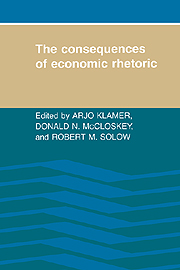Book contents
- Frontmatter
- Contents
- Preface
- The consequences of economic rhetoric
- PART I ECONOMIC RHETORIC: INTRODUCTION AND COMMENTS
- PART II ECONOMIC RHETORIC: FURTHER ARGUMENTS
- 5 Marxian theory and the rhetorics of economics
- 6 Economic rhetoric: The social and historical context
- 7 The ideas of economists
- 8 Should a scientist abstain from metaphor?
- PART III ECONOMIC RHETORIC AMONG ECONOMISTS
- PART IV ECONOMIC RHETORIC IN POLITICS AND JOURNALISM
- PART V ECONOMIC RHETORIC: ITS RHETORIC AND ITS CONSEQUENCES
- 1 Appendix: Other contributors and participants
- Index
5 - Marxian theory and the rhetorics of economics
Published online by Cambridge University Press: 07 September 2010
- Frontmatter
- Contents
- Preface
- The consequences of economic rhetoric
- PART I ECONOMIC RHETORIC: INTRODUCTION AND COMMENTS
- PART II ECONOMIC RHETORIC: FURTHER ARGUMENTS
- 5 Marxian theory and the rhetorics of economics
- 6 Economic rhetoric: The social and historical context
- 7 The ideas of economists
- 8 Should a scientist abstain from metaphor?
- PART III ECONOMIC RHETORIC AMONG ECONOMISTS
- PART IV ECONOMIC RHETORIC IN POLITICS AND JOURNALISM
- PART V ECONOMIC RHETORIC: ITS RHETORIC AND ITS CONSEQUENCES
- 1 Appendix: Other contributors and participants
- Index
Summary
Marxism contributes something quite distinctive to the growing awareness among economists that theirs is a kind of theory or discourse or rhetoric and that it is therefore unavoidably embroiled in the intensely argued disagreements over the nature of theory(ies), truth(s), science(s), and so forth. These issues have been debated as well within the Marxian tradition under the heading of epistemology. We will outline several Marxian positions on epistemology, with special stress on the one we find compelling. It partly resembles the positions, for example, of Rorty (1979) in philosophy, McCloskey (1985) in economics, and Gould (1981) in biology. However, there are also significant differences, since our position emerges from the Marxian tradition while theirs do not.
Marxian and non-Marxian economists usually think of their respective approaches as illuminating some basic (essential) set of social forces operating in economic reality. Typically each group produces its particular explanation focused on that set: scarcity and individual preferences for the neoclassical and relations and forces of production for the Marxists. Each proves the validity of its explanation and, when pressed, proves the other's explanation to be in error.
We have been struck by the willingness of economists operating in these clearly different approaches to share nonetheless two key ideas: (1) one can discover a set of social processes that determines the behavior of all the other processes in society, and (2) one can discover some absolute standard that will prove to every honest thinker which of the alternative approaches to (theories of) society is, singularly, the truth. For some time we have raised questions about both of these ideas. More often than not we receive a common response from Marxist and non-Marxist economists alike.
- Type
- Chapter
- Information
- The Consequences of Economic Rhetoric , pp. 47 - 63Publisher: Cambridge University PressPrint publication year: 1989
- 1
- Cited by



